GP recruitment problems force NHS to run more surgeries
- Published
Most of Scotland's 987 General Practices are owned and run by GP partners
BBC Scotland research has shown that difficulties with GP recruitment have led to more doctors' surgeries being taken over by health boards.
NHS boards said 42 practices were now under their control - a measure used in special circumstances and emergencies.
Scottish Labour called it a "crisis" and claimed the number of patients registered at an "understaffed" GP practice was at least two million.
The Scottish government said there was no crisis in healthcare.
Public Health minister Maureen Watt said another £50m would be spent on primary care to ensure patients get the service they deserve.

NHS boards which run GP practices
NHS Forth Valley: "The aim of the health board is to return the management of the practice back to a team of independent GPs."
NHS Grampian: "We have nine salaried practices. These are long-standing practices, typically in areas where they might otherwise struggle to attract an independent practice."
NHS Highland: "It is likely that more practices will become directly managed in the future as GP s leave/retire."
NHS Lothian: "We are planning to take over the management of Leith Links Medical Practice in August."
NHS Shetland: "The practice in Lerwick has a long standing arrangement with the health board and the other two were sole practitioners."
NHS Tayside: "We run one GP surgery in Dundee which is based in a new multi-purpose facility where health, community, social and leisure services are delivered under one roof."

Most of Scotland's 987 General Practices are owned and run by GP partners.
However, some surgeries have previously been run by health boards rather than GP partners, often because they were situated in rural areas such as the Highlands, where they might otherwise have struggled to attract an independent practice run by GPs.
But in recent years, health boards have also had to step in in urban areas as an emergency measure to ensure patients continued to have access to a GP, after practices lost a number of doctors within a short space of time.
This has happened at Bannockburn and Kersiebank medical practices in NHS Forth Valley, Brimmond medical practice in NHS Grampian, as well as Bangholm and Kirkliston surgeries within NHS Lothian. Leith Links in Edinburgh will also be taken over next month.
Dr Carey Lunan, from the Royal College of General Practitioners, said: "In Edinburgh, where I work, a number of surgeries have had to close their lists.
"When that happens it means the burden falls to the remaining practices in that area, to register patients.
"The knock-on effect for patients is that they might find it difficult to register with the practice that is nearest to them.
"They might have to wait longer to see a GP. It's not unusual for me to hear that patients have to wait two or three weeks for a routine appointment.
"Patients might also not be able to see the same GP, so that's not great for continuity of care."
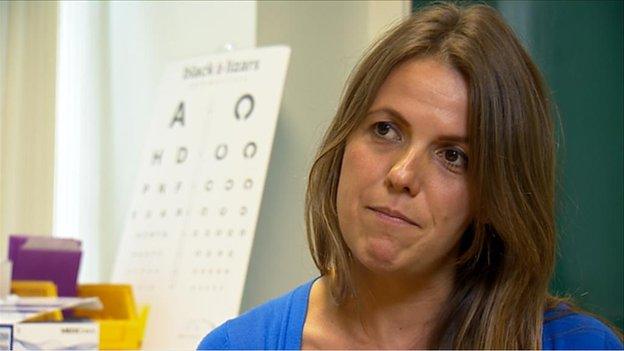
Dr Carey Lunan said the problem of retaining GPs was having a knock-on effect on workload
Dr Lunan added: "There are problems encouraging GPs into the profession, problems retaining GPs in the profession, and that's having a knock-on effect on workload and the quality of care that we can provide and our ability to develop services.
"The resourcing makes it very difficult for it to be an attractive career option for people coming in.
"One in eight training posts, from the 2014 figures, were unfilled. That's very different from how it was a few years ago when it was very difficult to get into General Practice training. It was very competitive."
Citizens Advice Scotland (CAS) said it has been approached by people who had faced problems accessing GP services because of high demand.
Christine Lang, national co-ordinator of CAS's Patient Advice and Support Service, said: "We had a case where there was a client who signed up with a new GP surgery and misread the time of the appointment.
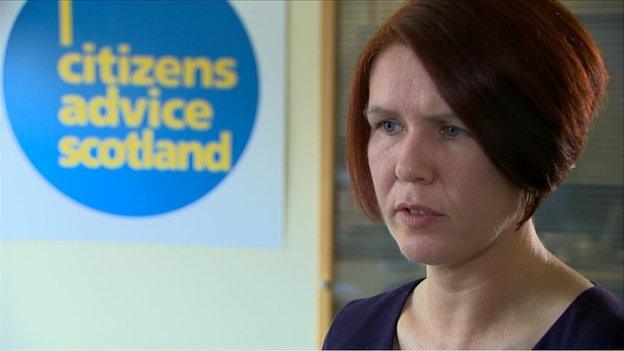
Christine Lang from Citizens Advice Scotland said everyone had the right to access a GP
"She was told that because she missed the appointment she wouldn't be able to use the service at all.
"We helped her to raise a complaint, and the GP practice explained they had a policy, because of the high demand, that if you missed your appointment, it was one strike and you're out.
"So she had to go to the hospital and then register with another GP surgery."
Ms Lang added: "Everyone has a right to access a GP and we're here to help them stand up for those rights."

Dr Philip Gaskell, GP in Forth Valley
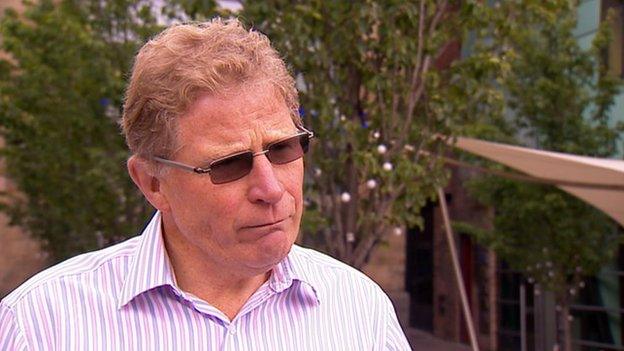
"There are a number of practices around Scotland, particularly in my area - Forth Valley - where vacancies for GPs are unfilled.
"It's seems that's mostly because young doctors are voting with their feet and not wanting to work in General Practice. They see a rather intense day, long hours, and they've seen opportunities in hospital where there may be less risk for them to manage and they would have colleagues nearby.
"It is a critical state of affairs at this point.
"Health boards are having to think imaginatively about how their patients are served. In many instances nurse practitioners and pharmacists are being invited to join teams. That's working pretty effectively in two of the practices I'm working in at the moment where there is difficulties.
"It's a domino effect in the practices. Perhaps a couple of GPs retire, someone finds a job elsewhere, several have gone to New Zealand and Australia - which are more attractive at the moment. Practices that had, say, seven doctors have ended up with two and that just doesn't work. So in that situation they've gone to the board and said please help us.
"We're working towards the government's 2020 vision of providing more care nearer to patients' own home but there's no question that we will need more resource - money and people. So it's possible it's going to get worse before it gets better."

Dr Richard Simpson, Scottish Labour's public health spokesman, who was also a GP for 30 years, carried out research into GP recruitment, separate to the BBC survey of Scottish health boards.
He sent out a questionnaire to all 987 GP practices in Scotland and received responses from 330 practices across all 14 health board areas.
It revealed 92 unfilled GP vacancies and 68 sessional GP vacancies - which covers locums and other doctors who cover sickness and holiday leave.
Dr Simpson said: "The evidence from a variety of sources, including our survey, is that General Practice is in considerable trouble at the present time. We haven't had a crisis like this in more than a generation.
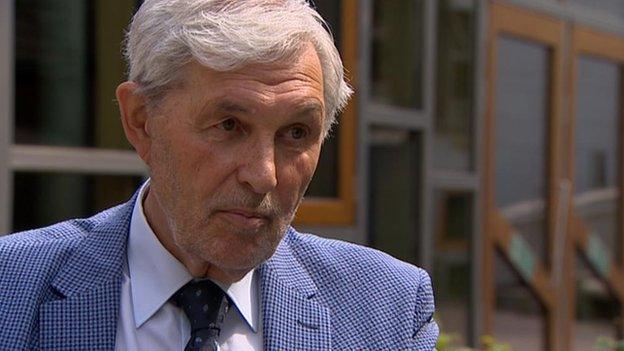
Dr Richard Simpson, Scottish Labour's public health spokesman, said the system was really creaking
"There are now around 40 practices which do not have GP partners at all, and that's not included in the vacancies. The system is really creaking.
"There's going to be a real knock-on effect on the out-of-hours system, because GPs who are working really hard - some of them up to 12 hours a day - are not going to then want to do an evening or night session. I know that's being looked at but that's a knock-on effect of the pressure.
"I suspect increasing numbers of patients will go to Accident and Emergency, and we know how much strain that's under.
"We're going to have a new GP contract in 2017, which is wonderful. But I think something has to be done now."
Scottish Liberal Democrat leader Willie Rennie MSP said: "These figures reveal a health system in crisis. The Royal College of GPs have already warned that Scotland will be 900 GPs short by 2020. Now we learn that health boards are already being forced to take control of more GP practices due to shortages.
"This is something that has only really happened in the past to ensure that services are maintained in more rural areas. The fact that we are now seeing health boards forced to step in in Edinburgh and other urban areas is shocking. This should be an urgent wake-up call for Scottish government ministers."
Maureen Watt, the minister for public health, told the BBC: "We now have nearly 5,000 GPs throughout Scotland - that's the highest number on record - up 7% under this government.
"GP surgeries run directly by health boards make up a small percentage of the total number of practices in Scotland and it's important to note that this number has changed very little over the past decade. Often it is more appealing to GPs to be in a salaried post, and in rural and deprived areas there can be many benefits for practices to adopt this model.
"In some parts of the country there is difficulty with recruitment but that's not something that's just happening in Scotland, it's happening in the rest of the UK and indeed over Europe.
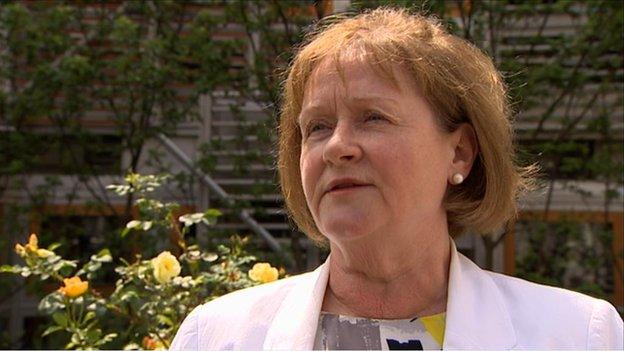
Public Health Minister Maureen Watt said there was not a crisis in the health service
"There is not a crisis in the health service, people are able to see their GP and they're able to see part of a team within the GP surgeries.
"We recognise that there are difficulties in the health service, we're working to very tight budgets, but we're working with the health professionals and GPs to see the way forward.
"We're putting £50m into primary care practices over the next three years to ensure that patients get the service they deserve."